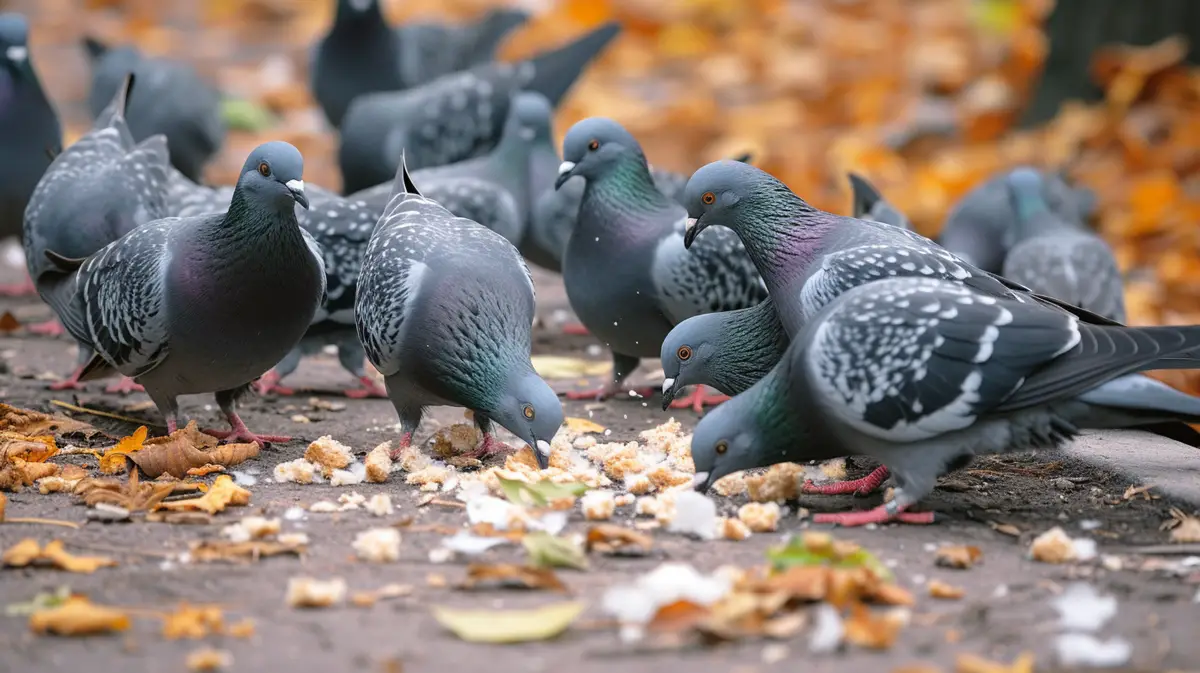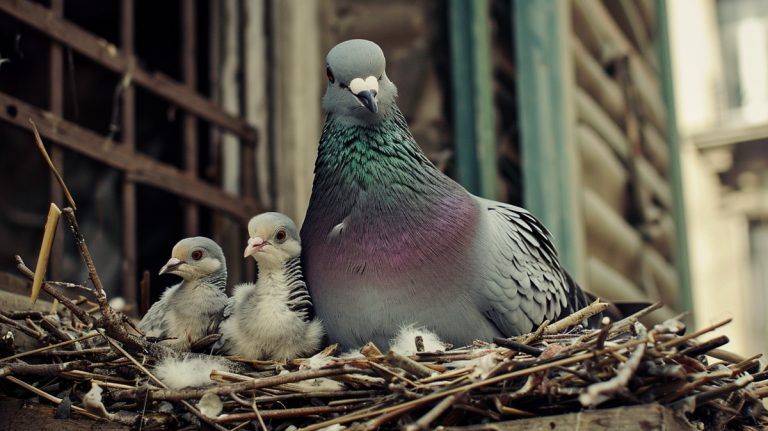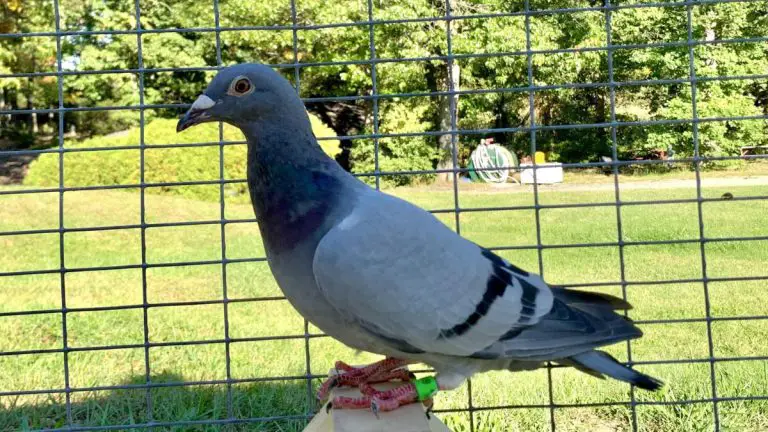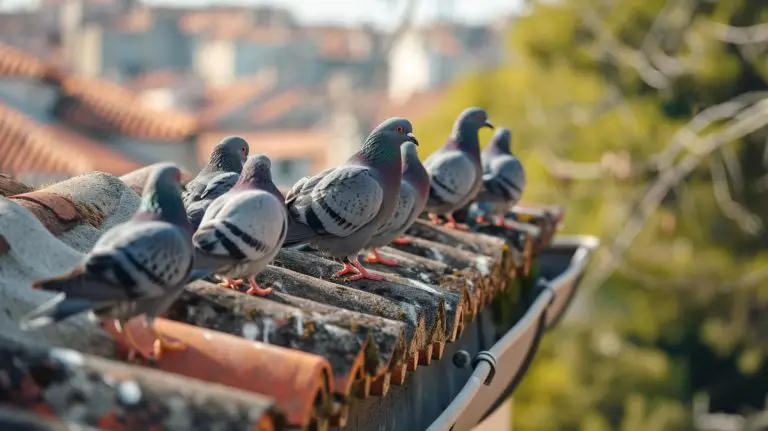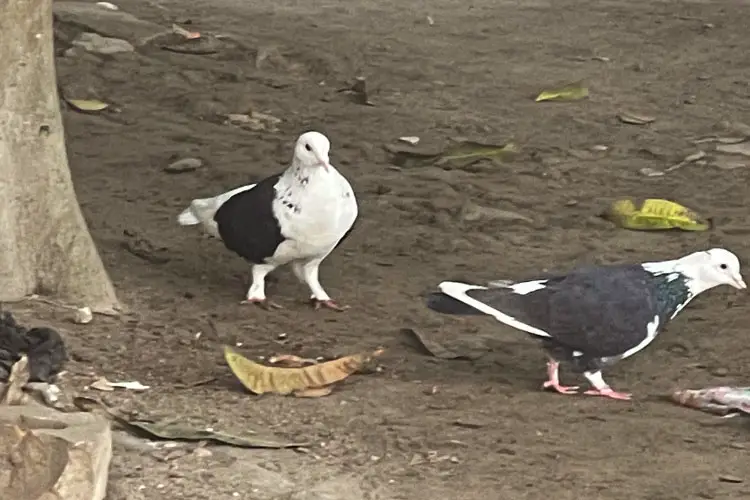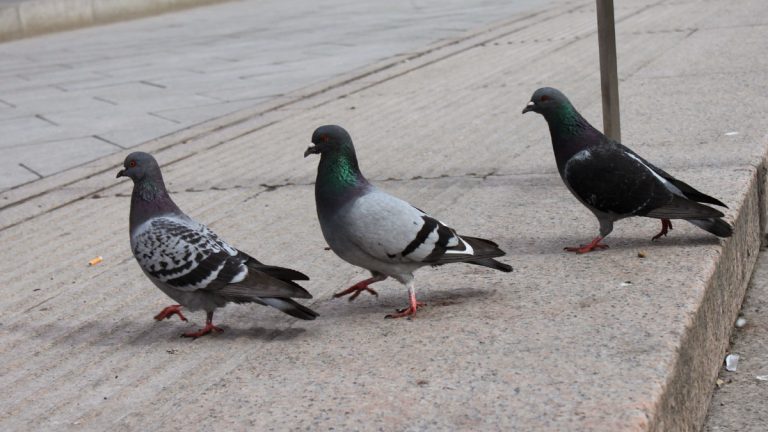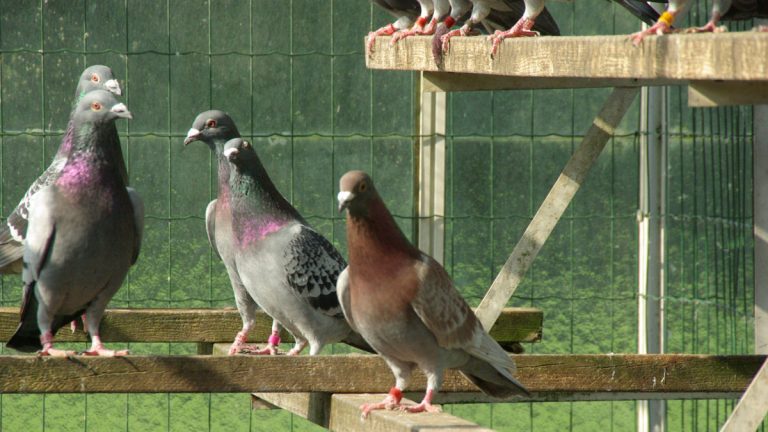What Do Pigeons Eat? Discover Their Natural and Urban Diet
Pigeons, those familiar feathered friends that grace our city streets and park benches, have a reputation for being opportunistic eaters. But have you ever wondered what exactly these urban dwellers munch on? In this article, I’ll delve into the dietary habits of pigeons and uncover the surprising range of foods that make up their menu. From seeds and grains to scraps of human food, these adaptable birds have developed quite the palate. So, if you’re curious about what fuels these avian creatures, stick around and let’s explore the world of pigeon cuisine together.
When it comes to feeding, pigeons are not picky eaters. They have a knack for finding sustenance in various environments, whether it’s a bustling city square or a quiet suburban backyard. From a breakfast of seeds and grains to a lunch of insects and worms, pigeons have a diverse diet that allows them to thrive in different habitats. But their culinary adventures don’t stop there. Pigeons have also been known to indulge in human offerings, scavenging for crumbs and leftovers that we leave behind. So, if you’ve ever wondered what pigeons eat, prepare to be surprised by the wide array of foods that these adaptable birds devour.
Pigeons are known for their flexible dietary habits and ability to find food in various environments. As adaptable birds, they have a diverse menu that allows them to survive in both urban and natural settings. Let’s explore the intriguing dietary habits of pigeons.
The Dietary Habits of Pigeons
Pigeons have a strong affinity for seeds and grains, which form a major part of their diet. They particularly enjoy munching on sunflower seeds, millet, corn, wheat, and barley. These nutritious food sources provide the necessary energy for their daily activities.
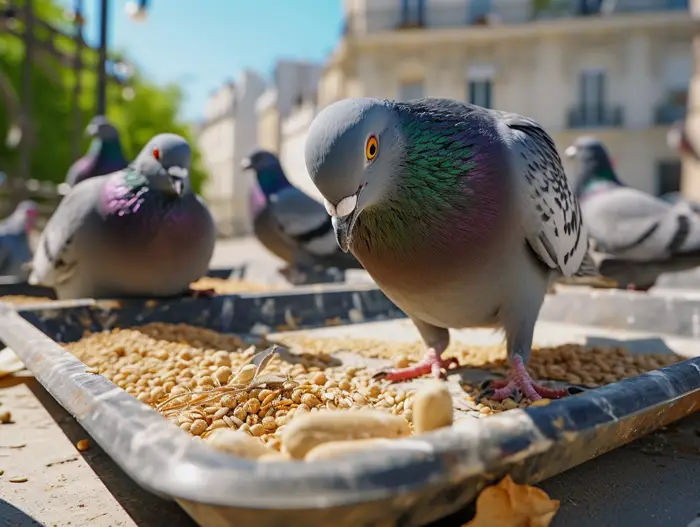
Insects and Worms
In addition to seeds and grains, pigeons also indulge in a protein-rich diet consisting of insects and worms. They eagerly hunt for these small creatures in gardens, parks, and even on city streets. Their keen eyesight and quick reflexes help them catch their prey with ease.
Human Food Leftovers
Pigeons are notorious for scavenging human food leftovers as well. When we leave our outdoor meals unattended or discard food scraps, pigeons are quick to take advantage of the opportunity. Their resourcefulness allows them to survive in urban environments by adapting to the presence of humans.
Surprising Favorites
While pigeons primarily rely on seeds, grains, insects, and human food leftovers, they have been known to eat a wide range of unexpected items. Some of their surprising favorites include bread, cookies, popcorn, and even cheese. These birds are not picky eaters and can find sustenance in the most unlikely places.
Pigeons’ diverse dietary habits have allowed them to flourish and adapt to various environments. Their ability to source food from a wide range of options ensures their survival even in challenging circumstances. It’s truly fascinating to observe the adaptability of these remarkable birds.
Seeds and Grains: A Staple in a Pigeon’s Diet
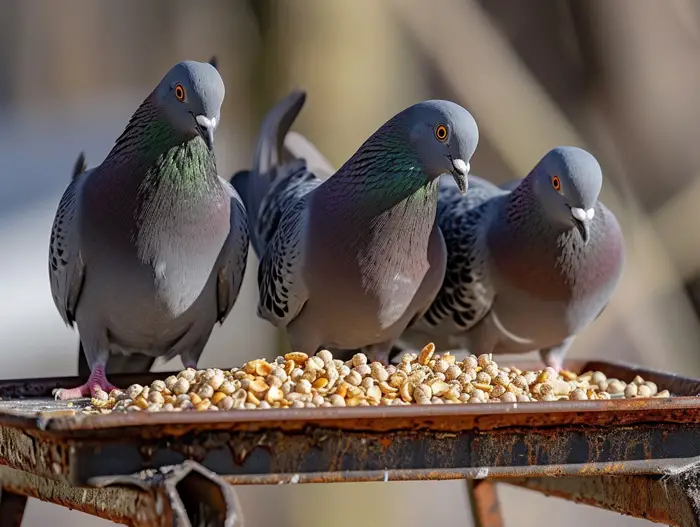
Pigeons have a diverse diet that allows them to thrive in various environments. One of the mainstays of their diet is seeds and grains. These tiny, nutrient-rich food sources provide pigeons with the energy they need to fly and survive. Here are some key points about seeds and grains in a pigeon’s diet:
- Variety: Pigeons consume a wide variety of seeds and grains, including sunflower seeds, millet, wheat, barley, corn, and oats. This diverse diet ensures that they receive a balanced mix of essential nutrients.
- Abundance: Seeds and grains are easily found in our surroundings, making them a readily available food source for pigeons. They are often found in fields, gardens, parks, and even on the ground near bird feeders.
- Adaptability: Pigeons have remarkable adaptability when it comes to their diet. They can eat both raw and sprouted seeds, as well as processed grains. This flexibility allows them to make the most of their environment and find sustenance wherever they are.
- Feeding behavior: Pigeons often forage for seeds and grains on the ground by pecking at the food with their beaks. They can also pick seeds from plants or pluck them from the ground.
- Important nutrients: Seeds and grains are packed with important nutrients that provide pigeons with energy, promote growth, and support overall health. These include carbohydrates, proteins, vitamins, and minerals.
- Effective digestion: Pigeons have a unique digestive system that enables them to efficiently break down and absorb nutrients from seeds and grains. Their gizzard, a muscular organ, helps grind the food particles, making digestion easier.
Seeds and grains are an essential part of a pigeon’s diet, providing them with the necessary energy and nutrients to thrive. Their adaptability and ability to find these food sources in diverse environments contribute to their remarkable success as urban dwellers and countryside inhabitants alike.
So now you have a better understanding of why seeds and grains play such a vital role in a pigeon’s diet. But what other types of food do these adaptable birds consume? Let’s explore further in the next section.
Insects and Worms: More Than Just Seeds and Grains
As I mentioned earlier, pigeons have a diverse diet that allows them to thrive in various environments. While seeds and grains are a staple in their food intake, it is important to note that pigeons also consume insects and worms. These additional food sources provide them with a balanced mix of nutrients that contribute to their overall health and well-being.

Pigeons have a remarkable ability to adapt their feeding habits based on the availability of food in their surroundings. In urban areas, where insects and worms may be less abundant, pigeons primarily rely on seeds and grains for sustenance. However, in more rural or natural environments, where insects and worms are plentiful, pigeons take full advantage of these protein-rich food sources.
You may be wondering, “How do pigeons find insects and worms?” Well, pigeons are highly skilled foragers and have developed strategies to locate these small creatures. They often search for insects and worms in grassy areas, flowerbeds, and even under piles of leaves. Pigeons use their keen eyesight to spot movement and their sharp beaks to capture their prey.
Insects and worms provide pigeons with essential nutrients such as protein, vitamins, and minerals that are crucial for their growth and energy levels. Incorporating these food sources into their diet ensures that pigeons have a well-rounded nutritional intake, supporting their ability to adapt and thrive in different habitats.
It is important to emphasize that while pigeons do consume insects and worms, seeds and grains remain a significant part of their diet. These versatile birds have the adaptability to eat a variety of food sources, allowing them to meet their nutritional needs in different environments.
By understanding the importance of insects and worms in the diet of pigeons, we can appreciate the ecological role that these birds play. Their ability to consume a diverse range of food sources contributes to their success as urban and countryside dwellers, making them a fascinating species to observe and learn about.
- Pigeons have a diverse diet that includes seeds, grains, insects, and worms.
- Insects and worms are a crucial source of protein, vitamins, and minerals for pigeons.
- Pigeons are skilled foragers and can locate insects and worms in various habitats.
- The availability of food determines the proportion of seeds, grains, insects, and worms in a pigeon’s diet.
Pigeons and Human Food: Exploring their Adaptability
Pigeons, with their remarkable adaptability, have also developed a knack for exploiting human food sources. In urban environments, where pigeons thrive alongside humans, they have learned to take advantage of the abundance of food options available to them. While their natural diet primarily consists of seeds, grains, insects, and worms, pigeons have become adept at incorporating human food into their diet.

Here are some interesting facts about pigeons and their adaptability when it comes to human food:
- Scavengers Extraordinaire: Pigeons are opportunistic feeders, and their ability to scavenge makes them successful in urban environments. They often search for scraps of food left behind by humans, such as bread crumbs and discarded fast food. This ability to adapt to human food sources has contributed to the overpopulation of pigeons in some cities.
- Dietary Diversity: While pigeons can survive on human food, it is important to note that it should not be their sole source of nutrition. They still require a balanced diet that includes seeds, grains, and protein-rich insects and worms. These natural food sources provide essential nutrients that may be lacking in human food. Humans can help maintain the health of pigeons by ensuring a diverse and balanced diet is available to them.
- Health Risks: Feeding pigeons human food may seem like a kind gesture, but it can have unintended consequences. Pigeons have sensitive digestive systems, and an unbalanced diet can lead to health issues. Feeding them food high in salt, sugar, or unhealthy fats can lead to obesity and nutrient deficiencies. Additionally, pigeon droppings can harbor pathogens that may pose risks to human health, especially in crowded urban areas.
- Responsible Interactions: To maintain a harmonious coexistence with pigeons, it’s important to engage in responsible feeding practices. If you choose to feed pigeons, do so in moderation and with appropriate bird feed that is specifically designed for their dietary needs. Avoid feeding them foods that are harmful to their health. Lastly, remember to clean up after feeding to avoid attracting pests and to keep the environment clean.
Conclusion
From seeds and grains to insects and worms, pigeons have a diverse and adaptable diet. While they have the ability to survive on human food, it is important to remember that it should not be their sole source of nutrition. Feeding pigeons an unbalanced diet can lead to health issues, and their droppings can harbor pathogens that may pose risks to human health.
To maintain a harmonious coexistence with these feathered friends, responsible feeding practices should be followed. This includes providing a diverse and balanced diet that mimics their natural food sources. By offering a variety of seeds, grains, insects, and worms, we can ensure that pigeons receive the necessary nutrients for their well-being.
Additionally, it is crucial to clean up after feeding to prevent the accumulation of droppings, which can attract pests and create unsanitary conditions. By taking these simple steps, we can foster a healthy environment for both pigeons and humans.
Understanding the dietary habits of pigeons and implementing responsible feeding practices is essential for their overall health and our coexistence with them. Let’s provide them with the nutrition they need while also maintaining a clean and safe environment.
